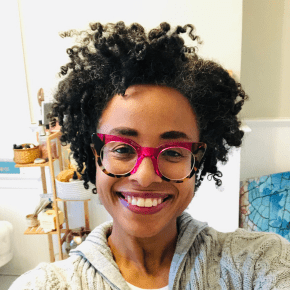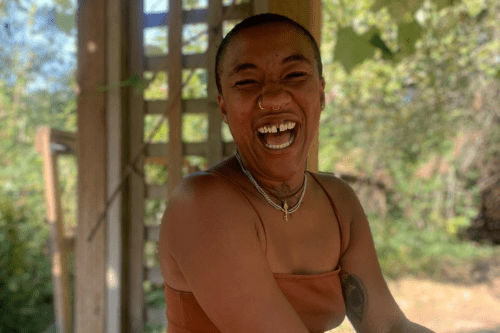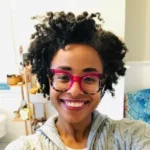AMS membership specialist Jasmine Johnson at her home in Seattle.
Storytelling is fundamental to our humanity and a critical element in Montessori education. As Montessori schools continue to work towards deeper equity goals and shape our dreams for more liberated classrooms and schools, we all benefit from reflecting on the lived experiences of those who are most impacted by any form of bias. In addition to creating space for critical questions, this kind of sharing provides the storyteller with necessary psychological space to be seen and heard.
American Montessori Society (AMS) membership specialist Jasmine Johnson recently shared her experiences with identity development and how some of her struggles ultimately propelled her into the field of Montessori education.
Jasmine is originally from Portland, Oregon and currently resides in Seattle, Washington. She has been working in Montessori since 2014 and has her AMS Early Childhood credential from the Montessori Teacher Education Institute of Atlanta. Jasmine has worked at both the Infant & Toddler and Early Childhood levels and also held a role of diversity, equity, and inclusion director before recently joining the AMS team in October 2023. In her free time, she enjoys hiking, biking, painting, and traveling.
Jasmine is passionate about racial justice, serving the underserved, and advocating for positive change in her local and broader communities.
What was the diversity of the areas in which you grew up? What was your school and childhood experience like?
I moved from Portland, Oregon to Hillsboro, a suburb about 20 minutes away, when I was in the fourth grade. My experience was overall good; however, I was surrounded by mostly white people in school and throughout my childhood. And I didn’t realize there was a difference until I moved there. I was literally the only Black child in my class and one of only a handful in the entire elementary school, which was a big culture shock for me.
I was young. I didn’t really understand a lot about what that would entail. I tried to fit in as much as possible. I hid parts of myself so that I could fit in. I didn’t want anybody to know anything about my home life, because I didn’t grow up with money. I was not wealthy, and we lived in an apartment until I was in high school. I didn’t want anyone coming over. I spent my life hiding things about myself—so that there were no questions. I didn’t want to stand out from the rest of my peers. I felt a bit embarrassed.
Overall, I had some great teachers. I also had teachers who treated me differently. I can remember a specific time in math class in fifth or sixth grade. I was told that I wasn’t able to take this specific test to potentially go up in the category, because they thought that I wasn’t going to be sufficient. They assumed that I wouldn’t score well. Meanwhile, everybody else around me took the test, and they just wouldn’t give it to me. I wasn’t allowed to even try.
That was an early incident that stood out to me. I thought, well, this is just normal. I didn’t know anything of it, because I was so young, and I just went with the flow most of the time.
I can also remember teachers not touching my head whenever they would do head lice checks at school. Every child would be checked, and when they got to me, they would skip me. Oh, you’re fine, you’re not going to get it. As a child, I remember thinking, check me, too! They should be checking me, and I remember going home and asking my mom what that was about. She said she knew exactly what they were thinking, that because you have this particular texture of hair, you wouldn’t need to be checked. You need to tell them next time, she said. It all seemed really scary, even though I knew things were not right, I also didn’t want to bring attention to myself. So, again, I would go with the flow of things most of the time.
Now that I’m older, I realize those things did affect me. They made me feel like I was an outsider. They made me feel uncomfortable, and I wasn’t able to be myself fully, in my skin, fully loved, and embraced because I was always forced into a different category from everybody else.
As I got older, I had friends, but even in those social circles, I was othered; there would always be a comment about my hair or some racist joke that I would just laugh off. But inside I was saying, “This is racist. You are spitting out racist things to me right now!”
I can’t believe that I didn’t speak up for myself in those moments, but I just didn’t know how.
Can you share about the support or lack thereof that you felt you had growing up and what the diversity was like where you grew up?
There was no place in my school for people of color to go to talk about these things, at least I didn’t know about it if there was. I mostly went to my family and talked about it with them. Although they totally understood what was happening, I just think they’re from a different generation, and it was extremely difficult to navigate the racism and bias. They would tell me the reasons why it happened, but they didn’t help me to self-advocate. The message I received was of protection, to keep my head down, and to fall in line, to not get into trouble with white people.
I turned to a friend who understood what I was going through. I’ve known her since fourth grade, and she was really like a person who would listen. She was white and couldn’t help me to navigate the bias and racism, but she would listen to me and have empathy. So I had that in school, but sadly nothing from my school community broadly.
There were 5 Black students in the school. And although I knew all of the Black people at my elementary school, we kind of isolated ourselves even from each other. We never got together or supported each other. It was almost as if we didn’t want to out ourselves by aligning with one another. There was a sense that if we were to band together, we’d bring negative attention to ourselves and make ourselves vulnerable. We were not willing to take that risk. Coming out of our white bubbles and identifying openly with other Black kids could potentially put us in situations where we’d somehow lose something—lose our white friends, the safety of being othered. I sense that we all had somehow made peace with the loss of our identities and preferred not to rock the boat.
Thankfully, towards the end of high school, I began to find my voice slowly. And it was then that I knew I wanted to be an educator. I knew I wanted to be impactful. I wanted to finally speak up and talk about these things—and break barriers. It was because of my own experiences.
Have you found a group of educators with whom you can interact, learn, and grow?
It took me a while to find such a group, especially in Portland as there aren’t many Black Montessori teachers out there. However, being in Montessori for a long time, I’ve attended various events and met different people.
Being a part of the Montessorians of Color affinity group at AMS, I’ve been able to connect with people, ask them about their experiences and bounce off ideas with each other. I believe that having such a group is crucial when you’re working in Montessori, especially since there are so few of us. It can be daunting to think that nobody else understands your experience. Having a support group has been important to me in my career as a Montessori teacher.
I’m happy to see that the affinity spaces have continued to thrive, especially the AMS en Espanol and Montessorians of Color groups. These two groups have been the most consistent and continue to thrive since their founding. This speaks to the need for spaces that prioritize identity and safety. I remember attending a meetup for Black Montessori teachers at an event for independent schools. It was amazing to see all these cool people doing great things in Montessori education. I was fangirling a bit, because I followed some of them on Instagram, and it was cool to see them in person.
I think I’ve been able to bring a unique perspective to my teaching practice, especially in the Pacific Northwest where I’ve taught for many years. As a Black Montessori teacher, I was able to connect with my students and provide representation for Black kids in the Montessori school system. I have intentionally created a safe space for my students to come to me and talk about their experiences, seek advice, or simply spend time with someone who looks like them and can relate to their experiences.
I believe it’s important for Black kids in Montessori schools to have representation and to know that they can come to me for support. Many Black students came to my office and simply wanted to sit with me, because they felt comfortable and saw me as a positive role model. This is something I didn’t have growing up, so I am grateful to be able to provide it for my students.
What are some things you associate with and/or appreciate about growing up on the West Coast, specifically the Pacific Northwest?
I currently live in the Pacific Northwest and feel that people in this region are making a conscious effort to be more aware of diversity and equity. I have previously lived in Atlanta and while I found the people there to be nice, I believe that the conservative politics in the city had an impact on the way people interacted. I appreciate that people in the Pacific Northwest allow others to be themselves and in some ways there is more support for teaching diversity and equity in schools. I have worked as a diversity, equity, and inclusion leader in a school in Seattle and while it was challenging, I received a lot of help from parents who wanted their children to learn about these values. I feel fortunate to be living in an area where there is freedom to teach and talk about these important topics. I appreciate that people are willing to learn and work towards creating a more inclusive society.
On the other hand, I also experienced a lot of pushback when I moved into an equity leadership role. I remember when I started some people did not understand the importance of it. They thought I was just going to come and read a book or something. But when I started giving lessons in classrooms about gender and identity, some parents were not happy. They didn’t want me to talk to their children about gender or read those books to them. They were not aware that I was going to be doing those things even though we had informed them before. I think my biggest problem with teaching anti-racist education in the Pacific Northwest is that while many people say they want to learn how to develop a deeper understanding of how inequalities affect lives and communities they aren’t always willing to do the uncomfortable work that goes along with that, which starts from looking at yourself and how your contributing to white supremacy culture. So, I faced pushback from the parents and administration, which was frustrating because I didn’t feel supported by the people I worked with. It’s like they wanted me to take on the role, but not the responsibilities that came with it.
During my role as the diversity leader, I introduced various books to students. Each month, I planned a different theme and selected books from websites such as fatbookshelf.com and socialjusticebooks.org. One of the themes was identity, including gender identity and other related topics. I read the books and then discussed the concepts with my students. The conversations were organic and natural, and the students had many questions. The students were always engaged, and they often led the discussions on their own. I remember seeing Amelia Sherwood of Sankofa Learning Center executing a beautiful lesson on skin tones, and I mimicked her approach in the classroom. The students were fascinated by the lesson and had many questions. I kept the lessons simple yet engaging, so the students could understand the concepts easily. The primary aim was to lay a foundation for students to understand social justice-related issues and then build on it. Although some parents may have had some reservations, they did not understand that it was the children who were driving the lessons. I cherished this role as it allowed me to connect with students in a different way than merely being their teacher.
What are your thoughts on Black History Month?
In terms of Black History Month, I think it’s an important time to celebrate Black history and the contributions of Black people to society. However, I also believe that we should celebrate Black history and culture year-round and not limit it to just one month. It’s important to integrate Black history and culture into our curriculum and daily lives so that everyone can learn and appreciate the richness of Black history, futures, and culture.
I think Black History Month is important, but it should not just focus on well-known figures like Martin Luther King, Jr. Instead, it should start at the beginning of the year and incorporate Black history throughout the year. During Black History Month, you can highlight lesser-known figures or community members. The African diaspora is extremely diverse and multifaceted. There are so many rich lessons that can be uplifted in the classroom—Black contributions to science and current innovation, the numerous artists, mathematicians, musicians, and designers who are pushing boundaries and leading the way in every industry.
This is how we can truly follow the child—whatever they are into can be discussed through the history and futures of Black people in this country. Climate studies, botany, culinary arts, education, and sports, it is an endless pot of greatness that we fail to expose our students to when we only think about 2 or 3 historical figures during February.
Jasmine’s Recommended Reading:
- Stamped From The Beginning by Ibram X. Kendi
- My Grandmother’s Hands by Resemaa Menakem
- This Book is Anti-Racist by Tiffany Jewell
- Raising Antiracist Children: A Practical Parenting Guide by Britt Hawthorne
- Developing a Liberatory Consciousness by Barbara J. Love
Maati’s Recommended Reading:
- Undrowned: Black Feminist Lessons from Marine Mammals by Alexis Pauline Gumbs
- Sisters of the yam Black Women and Self-Recovery by Bell Hooks
- The Pain We Carry: Healing from Complex PTSD for People of Color by Natalie Gutierrez
About the Author
 |
Maati Wafford (she/her) is the former director of equity and engagement for the American Montessori Society. For nearly two decades she has created brave spaces for Montessori educators to expand, build, and create more justice in the world. AMS credentialed (Early Childhood, Elementary I – II, Administrator). |
Interested in writing a guest post for our blog? Let us know!
The opinions expressed in Montessori Life are those of the authors and do not necessarily represent the position of AMS.


